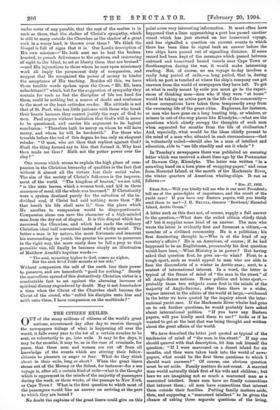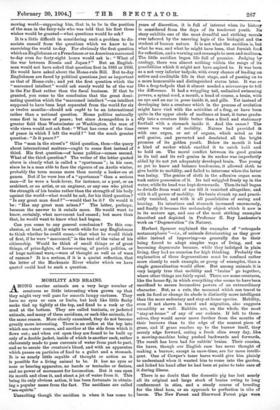THE CITIZEN EXILED.
No doubt the captains of the great liners could give on this
point some very interesting information. It must often have happened that a liner approaching a port has passed another vessel which has just started on her homeward voyage, and has signalled a question on current events to which there has been time to signal back an answer before the two ships have passed out of signalling distance. If some record had been kept of the messages which passed between outward and homeward bound vessels near Cape Town or Southampton during the war, it would make interesting reading. But, of course, no sea voyage to-day involves a really long period of exile,—a long period, that is, during which no port is touched at where the ship's company can get answers from the world of newspapers they have left. To get at what is really meant by exile you must go to the experi- ences of thinking men—men who if they were " at home" would be taking an active part in the life of the community— whose occupations have taken them temporarily away from the swarming life of the great cities. Explorers, for instance, or men who have gone on a long hunting trip, or whalers, or miners in out-of-the-way places like Klondyke,—what are the questions which chiefly occupy the thoughts of such men when separated for months from the life of civilisation P And, especially, what would be the ideas chiefly present to the mind of a man who, situated in such circumstances—that is, voluntarily exiled—should also be a man of intellect and education, able to " see life steadily and see it whole " ?
In Tuesday's newspapers there was published an amusing letter which was received a short time ago by the Postmaster of Dawson City, Klondyke. The letter was written " in a scrawling hand on a torn piece of wrapping-paper," and came from Herschel Island, at the mouth of the Mackenzie River, the winter quarters of American whaling-ships. It ran as follows:— " Nov. 17,1903.
DEAR SIR, Will you kindly tell me who is our next President ; tell me of the prize-fights of importance, and the result of the yacht race ? If you have any Eastern papers, will you kindly send them to me F—J. H. BELYEA, steamer Bowhead,' Herschel Island, Arctic Ocean."
A letter such as this does not, of course, supply a full answer to the question,—What does the exiled citizen chiefly think of ? but it supplies some kind of an answer. The man who wrote the letter is evidently first and foremost a citizen,—a member of a civilised community. He is a politician; his first dominating thought is,—Who is at the head of my country's affairs ? He is an American, of course ; if he had happened to be an Englishman, presumably his first question would have been,—What Ministry is in power ? But having asked that question first, he goes on—to what? First, to a rough sport, such as would appeal to men who are able to face the discomforts of a winter in Arctic seas ; next, to a contest of international interest. In a word, the letter is typical of the frame of mind of "the man in the street" of all Anglo-Saxon nations. Home politics and home sport,— probably those two subjects come first in the minds of the majority of Anglo-Saxons; after them there is a wider, vaguer interest in the affairs of the world at large,—evidenced in the letter we have quoted by the inquiry about the inter- national yacht race. If the Mackenzie River whaler had gone on to ask further questions, he would probably have asked about international politics. "If you have any Eastern papers, will you kindly send them to me P " looks as if he wanted to get at the best that was being thought and written about the great affairs of the world.
We have described the letter just quoted as typical of the tendencies of mind of " the man in the street." If any one should quarrel with that description, let him ask himself the question: "If I were marooned on a desert island for six months, and then were taken back into the world of news- papers, what would be the first three questions to which I should want answers ?" Of course, one obvious question must be set aside. Family matters do not count. A married man would naturally think first of his wife and children; but here we are imagining not so much a marooned man as a marooned intellect. Some men have no family connections that interest them ; all men have connections that interest them outside their families. Putting family matters aside, then, and supposing a " marooned intellect" to be given the chance of asking three separate questions of the living,
moving world—supposing him, that is, to be in the position of the man in the fairy-tale who was told that his first three wishes would be granted—what questions would he ask ?
It is a little difficult in considering such a problem to dis- sociate oneself from the questions which we know to be exercising the world to-day. For obviously the first question which an Englishman or a Frenchman or an American marooned to-day even for forty-eight hours would ask is : " What of the war between Russia and Japan ? " But an English- man would not have asked that question first in 1885 or 1886. He would have asked about the Home-rule Bill. But to-day Englishmen are faced by political questions just as important as that of Home-rule ; and yet the first question which the " marooned intellect" would ask surely would be of the war in the Far East rather than the fiscal business. If that be granted, you come to the conclusion that the great domi- nating question which the "marooned intellect "—an intellect supposed to have been kept separated from the world for six or twelve months—should ask ought to be an international rather than a national question. Home politics naturally
come first in times of peace ; but since Armageddon is a greater field than Westminster or Washington, the man of wide views would not ask first : " What has come of the time of peace in which I left the world ?" but the much greater question: "Is it peace ?"
The "man in the street's" third question, then—the query about international matters—ought to come first instead of third. His first question—of home politics—comes second.
What of the third question ? The writer of the letter quoted above is clearly what is called a "sportsman"; in his case, since he is a man able to face the rigours of an Arctic winter, probably the term means more than merely a looker-on at games. But if he were less of a. "sportsman" than a serious man—if he were a book-lover, for instance, or a poet, or an architect, or an artist, or an engineer, or any one who pitted the strength of his brains rather than the strength of his body against the world—what would he ask, for his third question ? " Is any great man dead ? "—would that be it ? Or would it be : "Has any great man arisen?" The latter, perhaps, because the answer to it entails more. He would want to know, certainly, what movement had ceased ; but more than that, he would want to know what had begun.
Can you come to any general conclusion ? To this con- clusion, at least, it might be worth while for any Englishman to think whether he could come,—that what he would think of first, if he were " marooned," is the test of the value of his citizenship. Would he think of small things or of great things, of prize-fights, of horse-racing, of parish politics, or of huge national wars,—wars of thought as well as of wars of cannon ? It is a serious, if it is a quaint reflection, that the letter of the Mackenzie River whaler which we have quoted could lead to such a question.











































 Previous page
Previous page